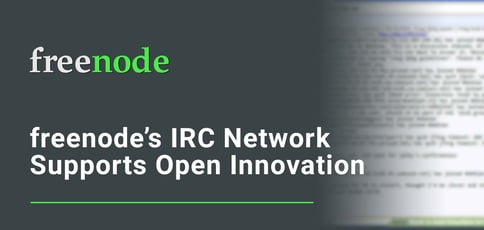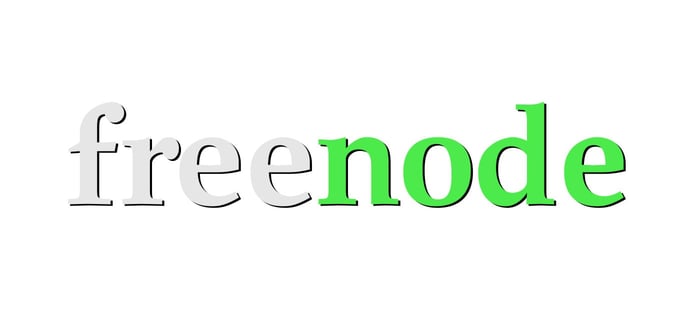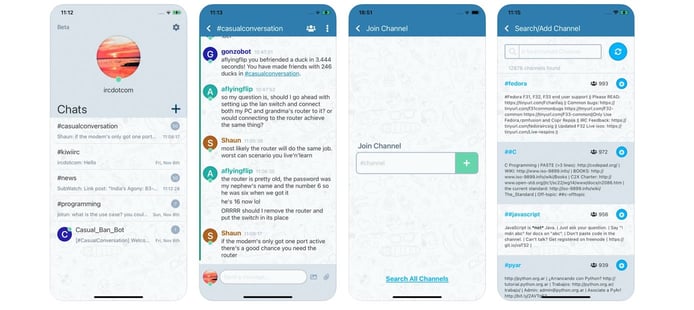
TL; DR: freenode is an internet relay chat network founded in 1998 as Open Projects Net (OPN). The network, which started with approximately 200 users and fewer than 20 channels, grew to become the most extensive network for the free and open-source software community. IRC.com by freenode, the group’s most recent release, provides Android and iOS applications that connect to the freenode bouncer, enabling push alerts and avatars, among other IRCv3-compatible features.
Internet Relay Chat (IRC) is a text-based chat system invented by Jarkko Oikarinen in 1988 — the heyday of the dial-up bulletin board system (BBS).
Jarkko created the first IRC client and server while working for the Department of Information Processing Science at the University of Oulu, Finland. His objective was personal: to add functionality to the BBS software he administered, enabling Usenet-style news, real-time discussions among participants, and question-and-answer dialogues.
But Jarkko didn’t keep his successes to a single server for long. The University of Oulu released his IRC code under a free and open-source license, prompting many universities to run their own IRC servers. By 1989, users were running the text-based chat solution on roughly 40 servers worldwide.
Now, 33 years later, many people turn to social networking platforms for their online communication needs. Still, there are more than 2,000 IRC servers and nearly 500 IRC networks operating across the globe to serve various purposes.

The IRC network freenode, for example, was created to support free and open-source software (FOSS) projects and innovation. “freenode has been around since 1998 and has since become the largest IRC network in the world and the home of FOSS,” said Andrew Lee, President of freenode, who is also known as “rasengan” online.
We recently caught up with Andrew to find out how freenode continues to help serve the FOSS community in 2021 — both through traditional services and new offerings like IRC.com by freenode.
Formerly Known as the Open Projects Network
freenode got its start on EFnet as a Linux support channel before evolving into its own network at irc.linpeople.org. The network was renamed the Open Projects Net in early 1998, when it supported roughly 200 users and fewer than 20 channels (divided by topic). It has been known as freenode since 2002.
The social network Facebook (known at the time as TheFacebook.com) launched in February 2004 — and IRC has taken a popularity hit ever since.
“The freedom of IRC was too much for some to bear,” Andrew wrote in a recent post published on the freenode newsfeed. “It needed to go. The IRC war came and went quickly, and IRC, from great millions of users when the internet was only millions of users, shriveled into a shell of its former self. From there, purpose-driven communications applications, with user interaction and narrative driven and controlled by the leadership of said apps, flooded the world.”

Andrew aims to preserve freenode’s digital territory as a safe haven for free speech — despite the fact that the IRC and FOSS spaces have also been fraught with challenges over the years. For example, IRC served as an early laboratory for many kinds of internet attacks, including old-fashioned denial-of-service (DDoS) attacks known as Nukes.
freenode, in particular, has faced its share of challenges in terms of ownership. Andrew attributes some of the recent controversies to what many refer to as cancel culture.
“The biggest shift I’ve seen in the open-source space has been the introduction of politics and character assassination culture,” he told us. “The freenode and FOSS communities have been dealing with these issues significantly. While continued attempts to derail progress are being made, the freenode community has been resilient. The majority of the people are quietly continuing to make commits (write code).”
Working with the Free and Open-Source Software Community
freenode has served as a basecamp for the FOSS community for more than two decades. In a May 19, 2021, post, Andrew said his goal is to engage the community in productive discussions with staff.
“I encourage the community to reach out and engage in discussion with the staff in #freenode-staff-discussion at any time in order to provide input on the future of freenode,” Andrew wrote in the post. “For all of the communities who are on the fence about what to do, please rest assured. freenode is freenode, and it exists for the sake of the FOSS movement.”
In an effort to protect the community, freenode recently updated its policies and will continue to upgrade its technology. “With our strong team, we’ll be able to take freenode and IRC further,” Andrew wrote in another post. “It’s a new era for freenode and IRC and a great era for FOSS and open innovations!”
The freenode team is working to enhance voter representation across the freenode userbase and make the server-link process more inclusive. freenode also aims to reduce reliance on its centralized network, which may include revisiting server nomenclature and pivoting away from a single domain name.
Andrew told us his favorite aspect of freenode is the passion exuded by the community.
“It’s clear that freenode is the most well-loved IRC network, and we’re honored to be able to provide our services to the community,” he said.
New: IRC.com by freenode
Andrew said that freenode’s top benefits include its ease of use, best-in-class volunteer team, and status as the largest IRC network in the world (and home of the FOSS community).
Moving forward, he plans to expand upon those benefits with IRC.com by freenode. The open messaging platform aims to bring IRC to the mainstream with simple registration and robust, IRCv3-compliant capabilities, including avatars and emojis. In addition, users can stay online continuously, as with any messaging platform.

“In addition to our FOSS and free IRC bouncer service that keeps you connected 24/7, we now provide Android and iOS applications that connect to our freenode bouncer, enabling push notifications, avatars and a whole other suite of IRCv3 capabilities,” Andrew said.
One of the organization’s goals is to help continually evolve the state of IRC to the benefit of users.
“We’re serious about what we do, and our support to the FOSS community is second to none,” Lee said. “We have a lot coming on the horizon, and I highly recommend checking us out in the coming weeks.”
HostingAdvice.com is a free online resource that offers valuable content and comparison services to users. To keep this resource 100% free, we receive compensation from many of the offers listed on the site. Along with key review factors, this compensation may impact how and where products appear across the site (including, for example, the order in which they appear). HostingAdvice.com does not include the entire universe of available offers. Editorial opinions expressed on the site are strictly our own and are not provided, endorsed, or approved by advertisers.
Our site is committed to publishing independent, accurate content guided by strict editorial guidelines. Before articles and reviews are published on our site, they undergo a thorough review process performed by a team of independent editors and subject-matter experts to ensure the content’s accuracy, timeliness, and impartiality. Our editorial team is separate and independent of our site’s advertisers, and the opinions they express on our site are their own. To read more about our team members and their editorial backgrounds, please visit our site’s About page.

